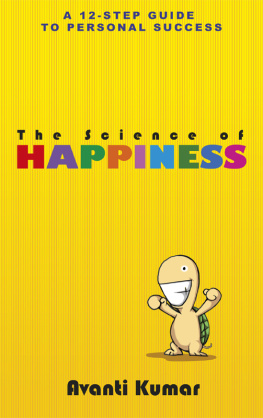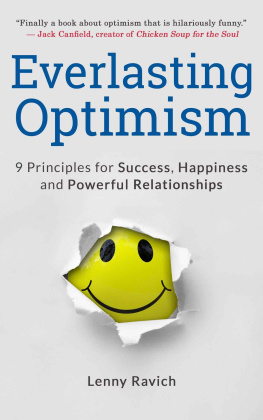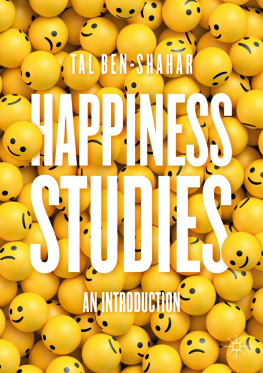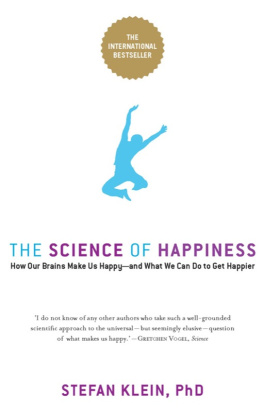To Tami, David, Shirelle, and EliavI love you, no matter what
Introduction
Happier, No Matter What
To me, the only satisfactory definition of happiness is wholeness.
Helen Keller
S o, Tal, shouldnt we quarantine happiness now? my friend asked me. He was only half joking.
We were deep into the coronavirus pandemic that swept the world. Undeniably, the COVID-19 crisis brought on a particularly intense series of challenges. Perhaps you got sick, feared becoming ill, or even endured the unimaginable pain of a loved ones death. Perhaps you suffered the loss of your job. Parents struggled to balance the competing responsibilities of work and childcare. Families and teachers agonized over whether it was safe to attend school. And we all felt the malaise of being isolated from friends and loved ones. For many, as stresses mounted, the fog of depression set in. Simple activities that we took for granted and used to turn to for relaxation vanished overnight, like going out to dinner or seeing a play, and the joyous celebrations we looked forward to, like vacations and weddings, were suddenly canceled. As we masked our faces to protect ourselves and others from the virus, it even became hard to share a smile with a stranger while walking down the street.
In the midst of this new reality, what was the relevance of studying happiness? From the time the coronavirus saga started, many people have echoed my friends sentiment that perhaps we should quarantine happiness, that the science of happiness should be put on hold for a while. They figured, sure, once things are back to normal, we can look at happiness again. But given everything going on in the world right now, shouldnt we press pause?
And my answer to that is no, we shouldnt quarantine happiness. We definitely shouldnt put it on hold! In fact, in challenging timeswhatever they may bestudying the science of happiness is more vital and relevant than ever.
Growing from Hardship
We can roughly situate all human experiences along a continuum spanning from negative, through neutral, to positive. For example, pain, suffering, misfortune, and hardship fall on the negative end, while pleasure, joy, fortune, and comfort belong on the positive end. Right in the middle we have the zero point, the Im doing OK point.

Many people believe that the role of the science of happiness is to deal with anything from neutral to positive. In other words, as long as youre doing OK or better, you can benefit from the research findings in the field. And if youre not doing wellif youre sad or anxious, going through hard times and strugglingwell, only psychotherapy or medication can help. Of course, I fully support seeking professional care. Therapy can help whether were doing fine overall or when our life feels out of control; medication, such as antidepressants or antianxiety drugs, has saved lives, and I would never recommend anyone stop medications without consulting with their physician. But the notion of having to reach neutral before one can benefit from the science of happiness is flawed.
The science of happiness is relevant for the entire spectrum of human experiences. Yes, it can certainly help us go from a 3 to a 5, from doing fine to doing really well. But its even more beneficial when were at minus 3, or minus 5. It can help us bounce backand even launch us beyond. Why? Because the science of happiness strengthens our psychological immune system. Needless to say, bolstering your psychological immune system, or your biological immune system for that matter, doesnt mean you wont get sick. It simply means youll get sick less often, and when you do, youll recover more promptly. The science of happiness can help you become happier, even if slightly so, no matter where you are along the spectrum. It also equips you to be better able to deal with difficulties and hardships when they arise.
In fact, with a strong psychological immune system, you could go a step beyond resilience. You could become antifragilewhat I think of as Resilience 2.0. Antifragile is a concept that was introduced by writer, epistemologist, and statistician Nassim Taleb, a professor at New York University. To understand antifragile, we need to start with resilience, a term taken from engineering. A particular substance or material is considered resilient if it returns to its original form after enduring stress or pressure. Along similar lines, to explain resilience we use the metaphor of a ball dropping and then bouncing back to its original point. According to Taleb, a substance or material is antifragile if, after enduring stress or pressure, it doesnt merely return to its original state, but grows stronger as a result. If a resilient ball bounces back to where it was before, an antifragile ball bounces back higher. More generally, an antifragile systemand that could be an inanimate object or a living entity in the form of a person, a relationship, a group of people, or even a nationgoes through hardship and consequently grows stronger, better, happier.
When Friedrich Nietzsche, the nineteenth-century German philosopher, wrote that Whatever does not kill me makes me stronger he was describing antifragility. And, indeed, you can grow from adversity, and experience antifragility, even if you have gone through extreme hardship. Trauma can pull us down or raise us up, leave us weaker or make us stronger.
In fact, research by psychologists Richard Tedeschi and Lawrence Calhoun at the University of North Carolina suggests that people faced with hardships are more likely to experience post-traumatic growth (PTG) than post-traumatic stress disorder (PTSD). Most of us have heard of PTSD, which can include painful consequences like reliving the trauma, anxiety and depression, difficulty concentrating, and trouble sleeping. But there is another potential enduring experience, a beneficial one, and that is PTG. Nothing, unfortunately, can guarantee growth after trauma, however there are certain conditions we can put in place to significantly increase the likelihood of that outcome. As I see it, a central objective of the science of happiness is to help individuals, families, organizations, and communities understand and apply these conditions, and thereby grow from the difficulties associated with the pandemic or any other hardship. There is much that we can do to become more antifragile.
From Research to Me-Search
I wrote this book so that you can have something to anchor you during tumultuous timesideas that you can hang on to, and most important, experiment with. Im a psychologist and an academic. In my profession, I draw on research a great deal. However, even more essential than research is me-search. Research is about looking at what other people have done, evaluating their actions, and learning from the result. Me-search is doing the same for the selflooking inside, experimenting with change.
Im a big fan of biographies. Theres much that we can learn from them, especially biographies of people who have done special and extraordinary things. One of my favorites is that of revered Indian leader and activist Mahatma Gandhi. Gandhis autobiography is subtitled The Story of My Experiments with Truth. Notice the language. Its not My Finding Truth. Its not My Discovery of Truth. Its My Experiments with Truth. Throughout his life, standing up for social justice, Gandhi experimented. He tried things. And this is what I would like you to do as you read through this book. Yes, you will learn about a lot of happiness research; yes, youll find tips for incorporating these ideas in your life. But more than anything, Id like you to play with these ideas and tips and see how things work for you. Some of the strategies may be highly relevant for you at this point in your journey; some may be relevant for you in the future; and some may not be relevant at allbut its difficult to know without trying.
Next page






